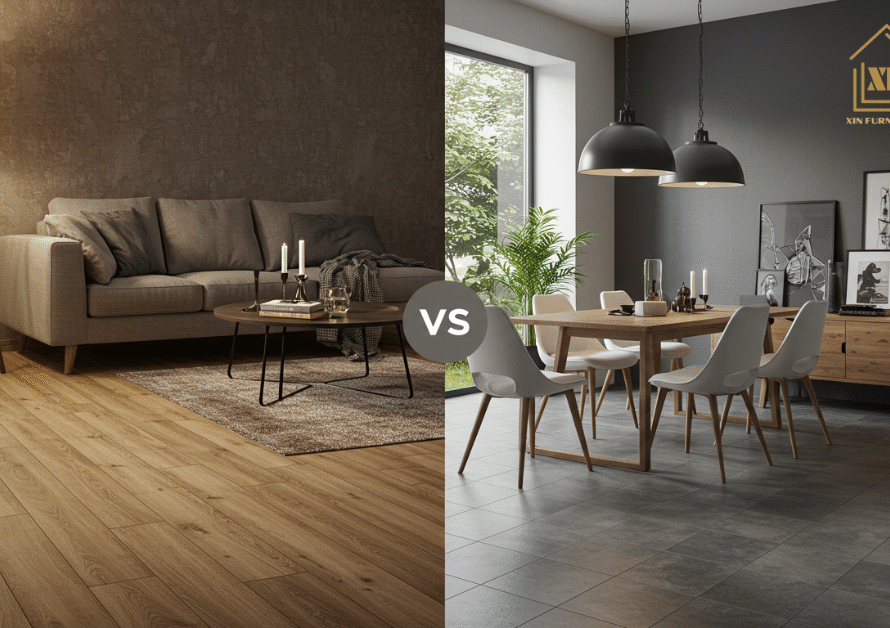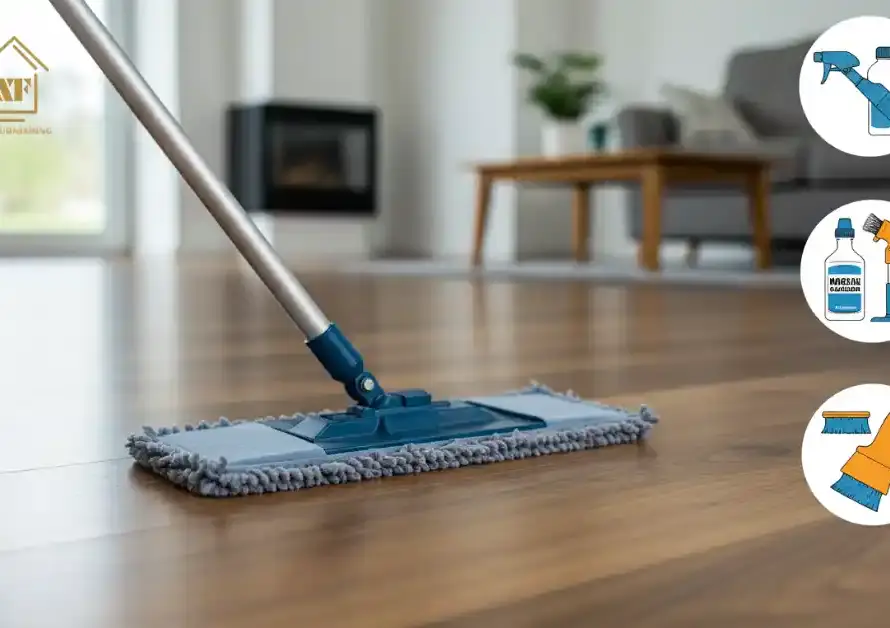The cost of Vinyl Flooring in Singapore is a top question for homeowners and businesses planning a renovation. Vinyl flooring is one of the most versatile, durable, and stylish flooring options available today. It’s perfect for living rooms, kitchens, offices, and even commercial spaces, offering a balance between practicality and aesthetic appeal.
Singapore’s tropical climate and busy lifestyle make durable, low-maintenance floors essential. Vinyl not only looks great but also withstands water, scratches, and heavy foot traffic. Whether you’re exploring vinyl wood flooring cost for a warm, classic look or stone vinyl flooring cost for modern elegance, understanding the costs, benefits, and factors involved can help you make a confident and long-lasting choice.
Why Choose Vinyl Flooring?
Vinyl flooring has become one of the most popular choices in Singapore, as it seamlessly blends practicality with style. Known for its durability, it can handle heavy use in homes and offices, resisting scratches from pets, furniture, and daily traffic.
Another big plus is its easy maintenance. Unlike carpets or tiles, vinyl only needs a quick sweep or mop to stay clean, making it ideal for families and busy lifestyles.
Design flexibility is another advantage. Vinyl can look like natural wood, stone, or ceramic tiles at a fraction of the cost. It’s also water- and scratch-resistant, making it a wise choice for kitchens, bathrooms, and other high-traffic areas.

Average Vinyl Flooring Cost in Singapore
Understanding the cost of vinyl flooring in Singapore is key before planning any renovation. Prices vary based on type, quality, and installation method:
Standard Vinyl Sheets:
Around SGD 5 to 15 per square meter (USD 3.60–10.80). Ideal for small rooms or utility areas, these sheets are budget-friendly, easy to clean, and durable enough for everyday use.
Vinyl Tiles:
Approximately SGD 10 to 25 per square meter (USD 7.20–18). Tiles offer design flexibility, allowing for patterns and textures that mimic the look of wood or stone. Damaged tiles are easy to replace individually, making them practical for both homes and offices.
Luxury Vinyl Planks (LVP):
Ranging from SGD 20 to 50 per square meter (USD 14.40–36). LVP mimics the look of hardwood or stone while being scratch-resistant and often waterproof. Perfect for living rooms, kitchens, bathrooms, or commercial spaces where style and durability matter.
Commercial Vinyl Flooring:
For offices or retail spaces, commercial-grade vinyl costs SGD 25 to SGD 60 per square meter (USD 18–43), due to its thicker wear layers and professional-grade finishes. The investment ensures longevity and minimal maintenance for high-traffic areas.
With prices ranging from SGD 5 to 50 per square meter (USD 3.60–36), vinyl flooring offers a practical, stylish, and cost-effective way to transform any space. It strikes a balance between affordability, durability, and design, making it a smart choice for both homes and commercial spaces.
Factors Affecting Vinyl Flooring Cost
Several factors influence vinyl flooring cost in Singapore, helping you plan your budget and expectations:
Type of Vinyl:
Sheet vinyl, vinyl tiles, and luxury vinyl planks (LVP) each have different costs and aesthetics. LVP is popular for its realistic wood or stone finishes, which add elegance and durability, although at a higher price point. Sheet vinyl is simpler and more budget-friendly, perfect for functional spaces.
Quality and Brand:
Well-known brands typically offer higher-quality materials, greater durability, and more comprehensive warranties. Choosing a trusted brand may initially be more expensive; however, it can provide long-term benefits. Still, it can save money over time by reducing maintenance and replacement needs.
Thickness and Wear Layer:
Thicker vinyl with a strong wear layer resists dents, scratches, and heavy use. This is especially important for offices or high-traffic areas, where durability directly impacts long-term value.
Installation Method:
DIY installation can save costs, but professional installation gives you a perfect fit, smooth finish, and long-lasting performance. Complex layouts, corners, and adhesive-based vinyl often require expert handling.
Area Size:
Bigger rooms usually cost more to cover with vinyl flooring. Some shops may offer discounts if you purchase a large quantity at once. However, don’t forget that extra work, such as joining floors between rooms or fixing uneven spots, can also add to the cost.
For businesses, commercial vinyl flooring costs can be higher due to the need for extra durability, specialised finishes, and professional installation, which is often required for offices, shops, or restaurants.
Pros and Cons of Vinyl Flooring
Like any flooring, vinyl has its strengths and some considerations:
Pros:
- Cost-effective without sacrificing style.
- Easy to maintain and clean.
- Resistant to water, scratches, and stains.
- Wide range of colours, patterns, and textures.
- Suitable for both residential and commercial spaces.
Cons:
- It can fade over time if exposed to direct sunlight.
- Doesn’t feel as premium as real wood or stone.
- Lower-quality vinyl may not last as long and can show wear in high-traffic areas.
Despite minor drawbacks, vinyl remains a smart choice for homes and businesses in Singapore, combining long-term value with practical beauty.
Tips to Reduce Vinyl Flooring Costs
If you’re dreaming of new floors but worried about the cost, don’t stress; there are smart ways to keep your vinyl flooring project affordable while still getting stunning results. One of the best tricks is to buy more at once or keep an eye out for seasonal promotions. Accurate measurements will help you avoid overspending on extra material you don’t actually need.
When it comes to quality, you don’t always have to go for the most expensive option. Mid-range vinyl is often the sweet spot, giving you durability and style without the premium price tag. For those who love a little DIY, installing click-lock or peel-and-stick vinyl in simple rooms can save you quite a bit on labour costs. Just make sure your subfloor is clean and smooth for the best results.
For trickier spaces, such as bathrooms, irregular corners, or larger commercial areas, it’s worth bringing in the pros. Professional installation ensures your floor fits perfectly and lasts for years to come. And finally, plan your layout carefully; this minimises waste, makes better use of your materials, and helps you stretch every dollar. With a bit of planning and wise choices, you can enjoy a beautiful, durable vinyl floor without breaking your budget.
Conclusion
The cost of vinyl flooring in Singapore makes it an attractive and practical choice for homes, offices, and commercial spaces. With durable, easy-to-clean, and stylish options available, vinyl flooring allows you to create a space that looks beautiful and performs well for years.
Whether you prefer vinyl wood flooring for a warm, classic look or stone vinyl flooring for modern elegance, vinyl provides flexibility, comfort, and long-term value. By selecting the right type, quality, and installation method, your space can be transformed into a stylish, practical, and enjoyable environment. Vinyl flooring isn’t just about covering the floor; it’s about creating a space that feels comfortable, welcoming, and lasting.
FAQs
1. What is the lifespan of vinyl flooring?
High-quality vinyl flooring can last 10 to 20 years with proper care. Luxury vinyl planks and well-maintained sheets often last longer, even in high-traffic areas.
2. Is vinyl cheaper than carpet?
Yes. Vinyl is generally more affordable upfront and lasts longer than carpets. It’s easier to clean, resists stains, and doesn’t require professional cleaning like carpet does.
3. Which is best, vinyl or laminate flooring?
Vinyl is water-resistant and low-maintenance, making it an ideal choice for bathrooms, kitchens, and high-traffic areas. Laminate may feel more like wood, but it can warp if exposed to moisture.
4. Are vinyl floors waterproof?
Most vinyl flooring is water-resistant, and many luxury vinyl planks are fully waterproof, making them ideal for bathrooms, kitchens, and laundry areas.
5. How to install vinyl plank flooring in a bathroom?
Ensure the subfloor is dry and level. Use waterproof adhesive if necessary, and seal edges around fixtures. Click-lock planks can be installed without glue, but proper sealing keeps the durability in wet areas.


